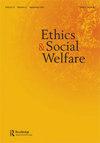专注于解决方案的实践与认可的心理健康专业人员的作用
IF 0.9
Q4 SOCIAL WORK
引用次数: 0
摘要
摘要根据《1983年精神卫生法》,经批准的精神卫生专业人员(AMHP)在拘留个人的决定中发挥着关键作用。这篇文章是一篇反思性的报道,展示了以解决方案为中心的方法如何使AMHP能够与被评估者进行建设性的接触,并应用反压迫实践的价值观。使用以解决方案为重点的方法可以对风险进行创造性和赋权性的讨论,并可能导致限制性较小的结果。这些技术应成为AMHP培训和持续教育的一部分。本文章由计算机程序翻译,如有差异,请以英文原文为准。
Solution-focused Practice and the Role of the Approved Mental Health Professional
ABSTRACT
The Approved Mental Health Professional (AMHP) has a pivotal role in a decision to detain an individual under the Mental Health Act 1983. This article is a reflective account demonstrating how a solution-focused approach can enable an AMHP to engage constructively with the person being assessed and apply the values of anti-oppressive practice. Using a solution-focused approach enables a creative and empowering discussion of risk and may lead to a less restrictive outcome. These techniques should be part of the training and ongoing education of AMHPs.
求助全文
通过发布文献求助,成功后即可免费获取论文全文。
去求助
来源期刊

Ethics and Social Welfare
SOCIAL WORK-
CiteScore
1.60
自引率
20.00%
发文量
36
期刊介绍:
Ethics and Social Welfare publishes articles of a critical and reflective nature concerned with the ethical issues surrounding social welfare practice and policy. It has a particular focus on social work (including practice with individuals, families and small groups), social care, youth and community work and related professions. The aim of the journal is to encourage dialogue and debate across social, intercultural and international boundaries on the serious ethical issues relating to professional interventions into social life. Through this we hope to contribute towards deepening understandings and further ethical practice in the field of social welfare. The journal welcomes material in a variety of formats, including high quality peer-reviewed academic papers, reflections, debates and commentaries on policy and practice, book reviews and review articles. We actively encourage a diverse range of contributions from academic and field practitioners, voluntary workers, service users, carers and people bringing the perspectives of oppressed groups. Contributions might include reports on research studies on the influence of values and ethics in social welfare practice, education and organisational structures, theoretical papers discussing the evolution of social welfare values and ethics, linked to contemporary philosophical, social and ethical thought, accounts of ethical issues, problems and dilemmas in practice, and reflections on the ethics and values of policy and organisational development. The journal aims for the highest standards in its published material. All material submitted to the journal is subject to a process of assessment and evaluation through the Editors and through peer review.
 求助内容:
求助内容: 应助结果提醒方式:
应助结果提醒方式:


